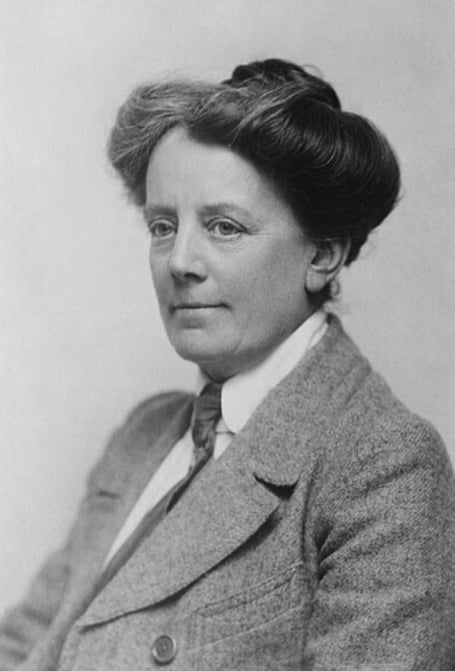Dame Ethel Smyth died on May 8, 1944 – and that week’s News & Mail included a glowing tribute to her.
The newspaper said that the celebrated composer and author was a “distinguished personality” and that she had passed away, aged 86, at her home, The Coign in Hook Heath.
The tribute added: “Though she had not taken an active part in the town’s public life, Dame Ethel had keenly interested herself in the district’s musical activities.”
In a nod to her time as a suffragette – as detailed in last week’s Peeps – the News & Mail’s obituary to Dame Ethel included a reference to her involvement in the fight for votes for women.
It noted that she had “joined enthusiastically into the suffragette agitation in 1912” and “was among those who suffered imprisonment as the outcome of the window-breaking campaign”.
The article said she had been a patron of the Woking district’s musical and choral societies and “on several occasions honoured concerts in Woking by personally conducting programmes of her own works”.
It recalled that her composition Mass in D became regarded as her greatest work and was first performed at the Royal Albert Hall, London, in 1893.
Other works of hers that were noted were her operas Der Wald and The Boatswain’s Mate and the compositions Fete Galante, Entente Cordial and The Prison.
The obituary highlighted her literary works – such as Impressions That Remained, a book of memories published in 1919, and Streaks of Life, that included descriptions of Empress Eugénie, Napoleon III’s widow, who lived her later life in Farnborough.
The obituary said Dame Ethel had known Eugénie “intimately”.
Dame Ethel’s funeral took place at Woking Crematorium.
The May 19, 1944 issue of the News & Mail published “an appreciation” of her by British classical pianist Adelina de Lara.
This included: “Many tales are told of her witticisms and little eccentricities – all know of her love for golf and tennis, for fresh air and animals, also of her interest in the women’s suffrage movement.
“I doubt, however, if many realise the generous nature she possessed and the tender heart with a great sympathy for all who suffered.
“One never appealed to her without receiving a speedy and sympathetic response.
“For instance, she sought my advice about selling her piano to help an old violinist in distress.
“Another time she took a long journey in mid-winter, suffering acute rheumatism, in order to hand personally a substantial sum to a musician who was stranded; she caught a bad chill returning home.
“One Christmas night she arrived at my house, when I was laid up with a broken leg, to give me two half-bottles of champagne (one in each pocket of her coat).
“As she was leaving she asked the friend who was nursing me if she had ‘done right’. My friend replied ‘Indeed you have done right, Dame’.
“I can recall a freezing cold morning with freezing roads and Dame Ethel on my doorstep.
“She had conducted at my orchestra concert the evening before, and she had walked from her home to ask me if I was ‘terribly tired after my strenuous work at the concert’.
“After remaining with me an hour talking all about my work, not her own, she left to walk back in the snow.
“I can see her now on the slippery path, her dog by her side, a final wave of the hand, a radiant smile.”
The article featured Claud Powell. He was a singer, music teacher and conductor who, in 1919, founded the Guildford Symphony Orchestra.
He asked that his appreciation of Dame Ethel be included.
He recalled: “At Guildford we have been privileged to perform a great many of her orchestral works including her horn and violin concerto and concerts of her chamber music and choral music.
“But I always believe what pleased Dame Ethel most was when we were able to stage her delicious comic opera The Boatswain’s Mate for two short runs at Guildford, which caused her to write most generously to the London press of our performance, holding it up as an example of what can be done, if done the right way, with very little expenditure.
“One of the few great ones left has passed on, and we shall sadly miss an outstandingly gracious and courteous personality.”
Thanks go to Mark Coxhead for finding these reports on microfilm copies of the News & Mail at the Surrey History Centre in Woking.




Comments
This article has no comments yet. Be the first to leave a comment.